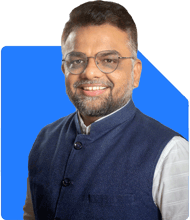10 Lakhs Investment Options With 1 Year Lock-in Period: Seeking Advice?
Ramalingam Kalirajan |10872 Answers |Ask -Follow
Mutual Funds, Financial Planning Expert - Answered on Oct 21, 2024
He has an MBA in finance from the University of Madras and is a certified financial planner.
He is the director and chief financial planner at Holistic Investment, a Chennai-based firm that offers financial planning and wealth management advice.... more

I have 10 lakhs.I want to invest the amount with better return and 1yr.locking pèriog
Importance of Short-Term Investment Strategy
With a one-year timeframe, taking too much risk may not be advisable. A sharp market downturn can hurt your returns, and there’s little time for recovery. Therefore, options that offer stable returns with limited risk should be your priority.
On the other hand, bank deposits may feel safe but can offer low returns. It’s essential to aim for an option that offers a good balance between safety and potential returns.
Potential Investment Options
Short-Term Debt Funds
These funds invest in high-quality bonds and debt securities with a short duration. They offer better returns than traditional savings and fixed deposits, with relatively low risk. You can expect moderate returns, but liquidity and safety are their strengths. Additionally, short-term debt funds are more tax-efficient if you fall under a higher income tax bracket.
Corporate Deposits (with a strong rating)
Some high-rated corporate deposits can offer higher returns compared to bank FDs. However, since these are company-based, credit risk exists. It's important to choose only highly-rated companies for better safety. This is a conservative yet slightly higher-yielding option.
Arbitrage Funds
These funds take advantage of price differences between the cash market and futures market. They are relatively low-risk and are ideal for short-term investors like you. Though they are categorized as equity funds, the nature of arbitrage funds ensures low risk. They are also tax-efficient if held for more than a year.
Fixed Maturity Plans (FMPs)
Fixed Maturity Plans are close-ended mutual funds. They invest in debt instruments with a fixed tenure, aligning well with your one-year investment horizon. They offer predictable returns, as the maturity of the fund aligns with the maturity of the instruments they invest in.
Liquid Funds
These funds invest in short-term money market instruments. They offer low returns but are very safe and liquid. While returns may not be high, liquid funds can be considered for your one-year goal, providing easy access to your funds without significant risk.
Tax Efficiency Considerations
Since you are looking for a one-year lock-in period, short-term capital gains (STCG) taxation will apply to most mutual fund investments.
For debt funds, short-term gains are added to your income and taxed as per your income tax slab.
In case you decide to invest in equity-based funds like arbitrage funds, short-term gains will be taxed at 20% on redemption.
Given the one-year timeline, it is essential to weigh the tax implications to ensure your net returns meet your expectations.
Risk Management
Low Risk Approach
For a conservative investor with short-term goals, stick to debt funds, high-rated corporate deposits, or even fixed deposits. These ensure capital preservation while offering decent returns.
Moderate Risk Approach
If you're willing to take slightly more risk for higher returns, arbitrage funds or short-term debt funds can offer better growth. However, it's important to note that market fluctuations can still impact returns.
Avoiding High-Risk Options
Given your one-year timeline, it’s advisable to avoid equity-based funds, especially small-cap or mid-cap, as these are prone to high volatility. The same applies to direct equity investments since the short timeframe doesn’t allow for recovery from potential downturns.
Insurance and Health Coverage Review
As a Certified Financial Planner, I would also advise reviewing your health insurance, especially given the short-term nature of this investment. If you have a comprehensive policy, that’s great, but ensure it covers your needs adequately. This will allow you to remain focused on investment without worrying about unexpected medical expenses draining your funds.
Final Insights
For your Rs 10 lakh investment over one year, focusing on debt-oriented funds or fixed-maturity plans seems ideal. These provide a balance of safety and returns without exposing you to unnecessary risks. While you can consider other short-term options like corporate deposits, safety should be your top priority due to the short-term nature of your goal.
Also, keep tax efficiency in mind. Opt for investments that minimize tax burdens on your short-term gains.
Best Regards,
K. Ramalingam, MBA, CFP,
Chief Financial Planner,
www.holisticinvestment.in
https://www.youtube.com/@HolisticInvestment
You may like to see similar questions and answers below
Vivek Shah | Answer |Ask -Follow
Financial Planner - Answered on Jun 19, 2023
Ramalingam Kalirajan |10872 Answers |Ask -Follow
Mutual Funds, Financial Planning Expert - Answered on Apr 12, 2024
Milind Vadjikar | Answer |Ask -Follow
Insurance, Stocks, MF, PF Expert - Answered on Oct 21, 2024
Radheshyam Zanwar |6735 Answers |Ask -Follow
MHT-CET, IIT-JEE, NEET-UG Expert - Answered on Dec 06, 2025
Dr Nagarajan J S K |2576 Answers |Ask -Follow
NEET, Medical, Pharmacy Careers - Answered on Dec 06, 2025
Mihir Tanna |1090 Answers |Ask -Follow
Tax Expert - Answered on Dec 06, 2025
Ramalingam Kalirajan |10872 Answers |Ask -Follow
Mutual Funds, Financial Planning Expert - Answered on Dec 06, 2025
Radheshyam Zanwar |6735 Answers |Ask -Follow
MHT-CET, IIT-JEE, NEET-UG Expert - Answered on Dec 06, 2025
Radheshyam Zanwar |6735 Answers |Ask -Follow
MHT-CET, IIT-JEE, NEET-UG Expert - Answered on Dec 06, 2025
Radheshyam Zanwar |6735 Answers |Ask -Follow
MHT-CET, IIT-JEE, NEET-UG Expert - Answered on Dec 06, 2025
Dr Dipankar Dutta |1837 Answers |Ask -Follow
Tech Careers and Skill Development Expert - Answered on Dec 05, 2025
Dr Shyam Jamalabad |108 Answers |Ask -Follow
Dentist - Answered on Dec 05, 2025
Dr Shyam Jamalabad |108 Answers |Ask -Follow
Dentist - Answered on Dec 05, 2025



























